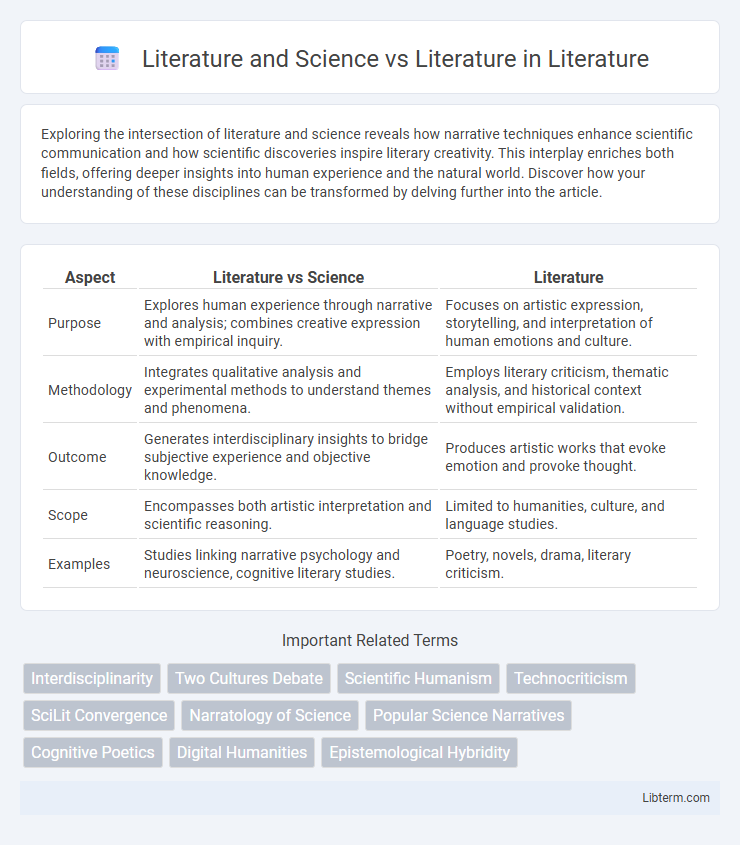Exploring the intersection of literature and science reveals how narrative techniques enhance scientific communication and how scientific discoveries inspire literary creativity. This interplay enriches both fields, offering deeper insights into human experience and the natural world. Discover how your understanding of these disciplines can be transformed by delving further into the article.
Table of Comparison
| Aspect | Literature vs Science | Literature |
|---|---|---|
| Purpose | Explores human experience through narrative and analysis; combines creative expression with empirical inquiry. | Focuses on artistic expression, storytelling, and interpretation of human emotions and culture. |
| Methodology | Integrates qualitative analysis and experimental methods to understand themes and phenomena. | Employs literary criticism, thematic analysis, and historical context without empirical validation. |
| Outcome | Generates interdisciplinary insights to bridge subjective experience and objective knowledge. | Produces artistic works that evoke emotion and provoke thought. |
| Scope | Encompasses both artistic interpretation and scientific reasoning. | Limited to humanities, culture, and language studies. |
| Examples | Studies linking narrative psychology and neuroscience, cognitive literary studies. | Poetry, novels, drama, literary criticism. |
Defining the Intersection: Literature and Science
The intersection of literature and science encompasses the exploration of scientific concepts and discoveries through literary forms, enriching both fields by fostering creativity and critical thinking. Literature interprets scientific phenomena by embedding them within cultural and ethical contexts, while science gains narrative frameworks that enhance public understanding and engagement. This interdisciplinary dialogue reveals how scientific knowledge shapes human experience and how storytelling can influence scientific inquiry.
Historical Perspectives on Literature and Science
Historical perspectives on literature and science reveal distinct yet intertwined evolutions, with literature traditionally emphasizing human experience and narrative while science prioritizes empirical observation and systematic inquiry. The Renaissance period marked a convergence where scientific discoveries influenced literary themes, reflecting a growing curiosity about nature and humanity. Enlightenment thinkers further bridged these fields by integrating scientific reasoning into literary criticism, shaping modern interdisciplinary approaches.
Literature as a Reflection of Scientific Thought
Literature serves as a profound reflection of scientific thought by integrating empirical discoveries and theoretical frameworks into narrative forms, thereby enriching cultural understanding of science. Literary works often mirror scientific paradigms, capturing the evolving relationship between humanity and technological innovation while exploring ethical implications and existential inquiries prompted by scientific advancements. This interplay fosters a dynamic dialogue that highlights how literature not only interprets but also critiques and disseminates scientific ideas within societal contexts.
Science Fiction: The Convergence of Two Worlds
Science fiction exemplifies the convergence of literature and science by blending imaginative storytelling with scientific principles, creating narratives that explore futuristic concepts and technological advancements. This genre bridges the gap between literary creativity and scientific inquiry, offering speculative insights into society, ethics, and the human condition. Renowned authors like Isaac Asimov and Arthur C. Clarke use scientific realism to enhance narrative depth, making science fiction a unique literary domain where empirical knowledge shapes imaginative worlds.
Methods of Inquiry: Analytical vs Interpretive
Literature and Science employ distinct methods of inquiry where science relies heavily on analytical approaches, utilizing empirical data, experiments, and quantitative analysis to derive conclusions. In contrast, Literature depends on interpretive methods, emphasizing critical analysis, thematic exploration, and subjective understanding of texts to uncover deeper meanings. These differing methodologies highlight the objective measurement inherent in Science versus the nuanced, context-driven insights fundamental to Literary studies.
Themes Explored in Literature and Science
Themes explored in literature often delve into human emotions, morality, and societal struggles, emphasizing subjective experiences and existential questions. Scientific literature, by contrast, focuses on empirical evidence, natural phenomena, and objective analysis to explain the physical world. Both disciplines intersect when examining themes such as human nature, knowledge, and the impact of technology on society, offering complementary perspectives.
The Role of Imagination in Science and Literature
Imagination plays a crucial role in both literature and science by enabling the creation of novel concepts and theories beyond empirical data. In literature, imagination constructs vivid narratives and emotional landscapes that explore human experience, while in science, it facilitates hypothesis generation and innovative problem-solving essential for breakthroughs. Both disciplines rely on imaginative thinking to push boundaries and expand understanding in their respective fields.
Literature Alone: Humanities’ Unique Value
Literature alone embodies the humanities' unique value by fostering critical thinking, cultural empathy, and ethical reflection through rich narratives and diverse perspectives. Unlike the empirical focus of science, literature explores human experiences, emotions, and social complexities, offering insights into identity, history, and morality. This distinct engagement with language and storytelling cultivates imagination and awareness essential for personal and societal growth.
Collaboration or Conflict: Bridging Literature and Science
The collaboration between literature and science enriches both fields by fostering a deeper understanding of human experience through empirical inquiry and narrative interpretation. Conflict often arises from differing methodologies and epistemologies, yet these tensions drive innovative approaches that challenge traditional boundaries. Bridging literature and science promotes interdisciplinary dialogue, leading to advances in fields like medical humanities, environmental studies, and digital storytelling.
The Future of Literature in an Age of Scientific Advancement
Scientific advancement reshapes the future of literature by integrating cutting-edge technologies such as artificial intelligence and virtual reality, creating immersive storytelling experiences. The fusion of literature and science fosters new genres that explore bioethics, quantum physics, and transhumanism, accelerating the evolution of narrative complexity. Literary works increasingly reflect scientific paradigms, emphasizing data-driven creativity and interdisciplinary collaboration to expand the boundaries of human imagination.
Literature and Science Infographic

 libterm.com
libterm.com